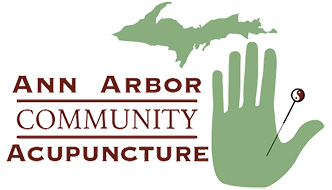Acupuncture is a complete system of medicine used in China for over 2000 years. It utilizes the insertion of very fine, sterile, stainless steel needles into points that access the body’s natural energy flow called “Qi.” It is especially effective for stress, anxiety/depression, insomnia, acute and chronic pain, and acute neurological complaints such as Bell’s Palsy and paraplegia due to stroke. Most people respond the best when acupuncture is used frequently, regularly, and started early in the course of a condition.
Community Acupuncture
Community acupuncture is a way to receive acupuncture in a group setting. Since acupuncture is most effective when treatment is used on a regular basis, community acupuncture allows people to get the amount of treatments they need in a shorter amount of time. In fact, this is still the way acupuncture is administered in hospitals across China. Often, profound healing can occur in a surrounding during which everyone shares the common goal of optimal wellbeing.
Related Acupuncture Treatments
Cupping, Moxa, Gua Sha, and Tui Na are adjunctive treatment modalities that work alongside acupuncture. Adjunctive treatments are only used when the acupuncturist deems it necessary.
Cupping is the use of glass cups and fire suction to bring blood flow to the surface. It is useful for many conditions with muscle pain. There is a risk of bruising after the treatment, which usually lasts 2-3 days. There is also a small chance of burn. It should not be used with bleeding disorders.
Moxa is using the energy from burning the Chinese herb Ai Ye therapeutically. There are different methods of application of this technique. It helps to increase circulation and decrease pain. There is a small risk of burn with this therapy.
Gua Sha and Tui Na are Chinese manual therapies. The former uses a porcelain spoon and the latter uses massage therapy.
Chinese Herbal Medicine
Chinese Herbal Medicine is a distinct system of medicine that utilizes plant, mineral, and animal substances to affect change in the body. They can be very effective for people who need additional support. We provide Chinese herbal consultations on a $20-40 sliding scale as an additional service. We believe that while almost everyone can benefit from acupuncture, herbs aren’t always necessary.
Acupuncture FAQs
Does it hurt?
Acupuncture should not hurt. In fact, you should feel very relaxed during the treatment. It is not surprising to feel immediate relief from pain after the needles are inserted. You may feel a slight pinch with the insertion of the needle and a dull, heavy sensation while the needle is inserted. There is a small chance of bleeding or bruising.
How does it work?
It is not clear what happens physiologically. There are some scientific theories postulating that the needles create a microcurrent in connective tissues, stimulating a literal electrical energy flow. There is also research highlighting possible biochemical mechanisms. In Traditional Chinese Medicine, each specific point has its own distinct function. And points lie along meridians–vessels that carry energy–akin to blood vessels carrying blood. Through this perspective, acupuncture primarily works by regulating energetic and functional imbalances in the body.
How often should I come?
The resolution of symptoms depends upon the individual and their condition severity and prognosis. Typically for functional issues like acute and subacute pain, insomnia, hot flashes, anxiety, and depression, notable improvements and even resolution can be achieved in 6-15 sessions. When you first seek care, it is recommended to get treatments at least once a week and up to 3 times a week depending on the severity and duration of your symptoms. After you see improvement, acupuncture treatments can be administered as needed.
What does it help with?
Acupuncture can be helpful for a wide variety of complaints. There has been research on its efficacy on the following conditions:
- Acne
- Acute pain
- Adverse reactions to radiotherapy and/or chemotherapy
- Allergy
- Anxiety
- Autoimmune diseases
- Bell’s Palsy
- Cardiovascular diseases
- Chronic Fatigue
- Chronic Pain
- Depression
- Digestive disorders
- Endocrine disorders
- Food Allergies and Intolerances
- Headache
- Infections
- Infertility
- Insomnia
- Menstrual disorders
- Migraines
- Menopause
- Morning Sickness
- Musculoskeletal complaints
- Neurological disorders
- Obesity
- Post-stroke therapy
- Sciatica
- Thyroid disorders

